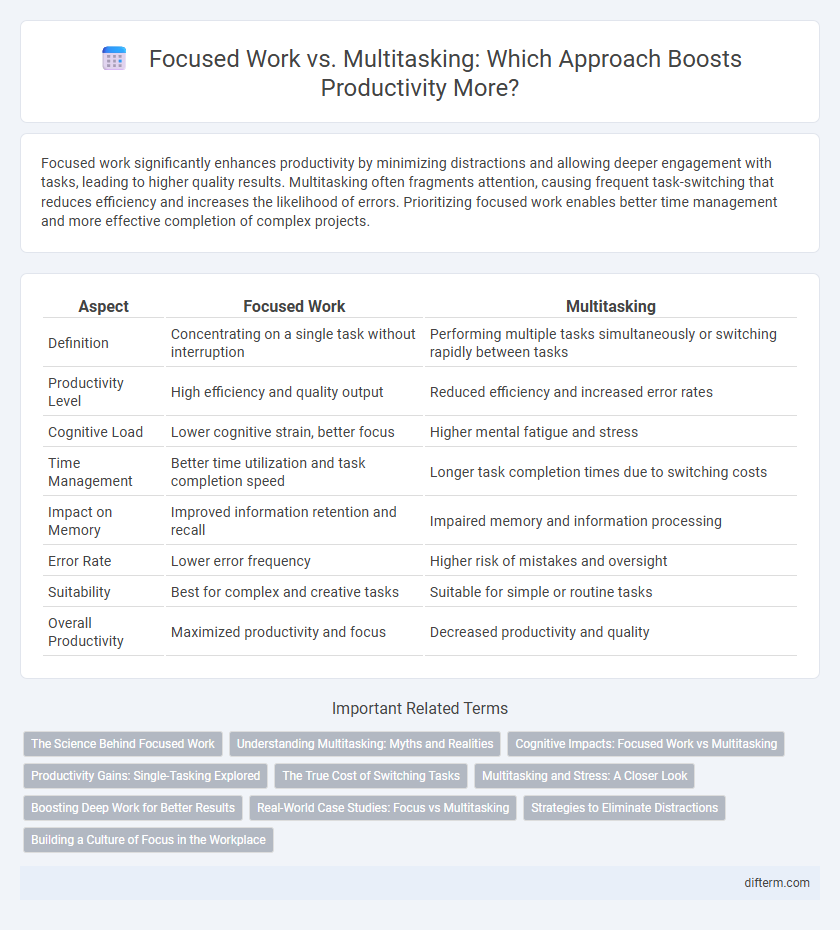Focused work significantly enhances productivity by minimizing distractions and allowing deeper engagement with tasks, leading to higher quality results. Multitasking often fragments attention, causing frequent task-switching that reduces efficiency and increases the likelihood of errors. Prioritizing focused work enables better time management and more effective completion of complex projects.
Table of Comparison
| Aspect | Focused Work | Multitasking |
|---|---|---|
| Definition | Concentrating on a single task without interruption | Performing multiple tasks simultaneously or switching rapidly between tasks |
| Productivity Level | High efficiency and quality output | Reduced efficiency and increased error rates |
| Cognitive Load | Lower cognitive strain, better focus | Higher mental fatigue and stress |
| Time Management | Better time utilization and task completion speed | Longer task completion times due to switching costs |
| Impact on Memory | Improved information retention and recall | Impaired memory and information processing |
| Error Rate | Lower error frequency | Higher risk of mistakes and oversight |
| Suitability | Best for complex and creative tasks | Suitable for simple or routine tasks |
| Overall Productivity | Maximized productivity and focus | Decreased productivity and quality |
The Science Behind Focused Work
Neuroscientific research reveals that focused work significantly enhances cognitive performance by engaging the prefrontal cortex, responsible for complex decision-making and problem-solving. Multitasking triggers task-switching costs, reducing efficiency by up to 40%, as the brain reallocates attentional resources instead of processing tasks simultaneously. Sustained attention facilitates neuroplasticity, strengthening neural pathways critical for skill acquisition and long-term productivity gains.
Understanding Multitasking: Myths and Realities
Multitasking often creates an illusion of efficiency but actually reduces productivity by causing frequent task-switching and cognitive overload. Research indicates that focused work increases information retention and task accuracy, as the brain operates best when concentrating on a single objective. Dispelling the myth that multitasking saves time reveals that deep work sessions enhance overall performance and reduce errors.
Cognitive Impacts: Focused Work vs Multitasking
Focused work enhances cognitive performance by minimizing distractions and allowing deeper information processing, which leads to improved memory retention and problem-solving abilities. Multitasking divides attention, increasing cognitive load and causing slower task completion with higher error rates. Prioritizing focused work leverages the brain's ability to concentrate on a single task, optimizing mental resources and boosting overall productivity.
Productivity Gains: Single-Tasking Explored
Single-tasking enhances productivity by reducing cognitive load and minimizing errors, leading to more efficient task completion. Research indicates that focused work can increase productivity by up to 40%, as switching between tasks causes significant time loss and mental fatigue. Prioritizing single-tasking improves concentration, supports deeper problem-solving, and results in higher-quality outputs.
The True Cost of Switching Tasks
Switching tasks frequently during work reduces productivity by up to 40%, as the brain requires time to refocus, causing cognitive fatigue and increased error rates. Focused work enables deeper concentration, fostering higher quality output and faster task completion. Embracing single-tasking minimizes the hidden costs of task switching, improving overall efficiency and mental clarity.
Multitasking and Stress: A Closer Look
Multitasking significantly elevates stress levels by overloading cognitive resources, leading to decreased efficiency and mental fatigue. Studies show that switching between tasks can reduce productivity by up to 40%, as the brain struggles to refocus with each transition. Chronic multitasking disrupts attention control, increasing cortisol production and contributing to long-term stress-related health issues.
Boosting Deep Work for Better Results
Focused work significantly enhances productivity by allowing the brain to engage deeply with complex tasks, leading to higher quality outcomes and faster problem-solving. Multitasking divides attention and reduces cognitive efficiency, causing more errors and longer task completion times. Prioritizing deep work sessions with minimized distractions can dramatically improve concentration, creativity, and overall performance.
Real-World Case Studies: Focus vs Multitasking
Real-world case studies reveal that focused work significantly enhances productivity and task quality compared to multitasking, which often leads to increased errors and longer completion times. For example, research from Stanford University shows that multitaskers perform worse on cognitive tasks and have reduced efficiency by as much as 40%. Companies like Microsoft and IBM have implemented focused work strategies, resulting in measurable improvements in employee output and job satisfaction.
Strategies to Eliminate Distractions
Effective strategies to eliminate distractions during focused work include creating a dedicated workspace free from non-essential devices, using apps or tools that block access to distracting websites, and scheduling specific time blocks for uninterrupted tasks. Prioritizing single-tasking enhances cognitive performance and reduces errors compared to multitasking, which often divides attention and prolongs project completion times. Implementing mindfulness techniques and setting clear boundaries with colleagues can further strengthen concentration and boost overall productivity.
Building a Culture of Focus in the Workplace
Building a culture of focus in the workplace significantly enhances productivity by encouraging employees to engage in focused work rather than multitasking, which often leads to decreased efficiency and increased errors. Implementing clear priorities, minimizing distractions, and promoting deep work practices help teams achieve higher-quality outputs and faster task completion. Organizations that foster environments supporting sustained concentration report improved employee satisfaction and measurable performance gains.
Focused Work vs Multitasking Infographic

 difterm.com
difterm.com